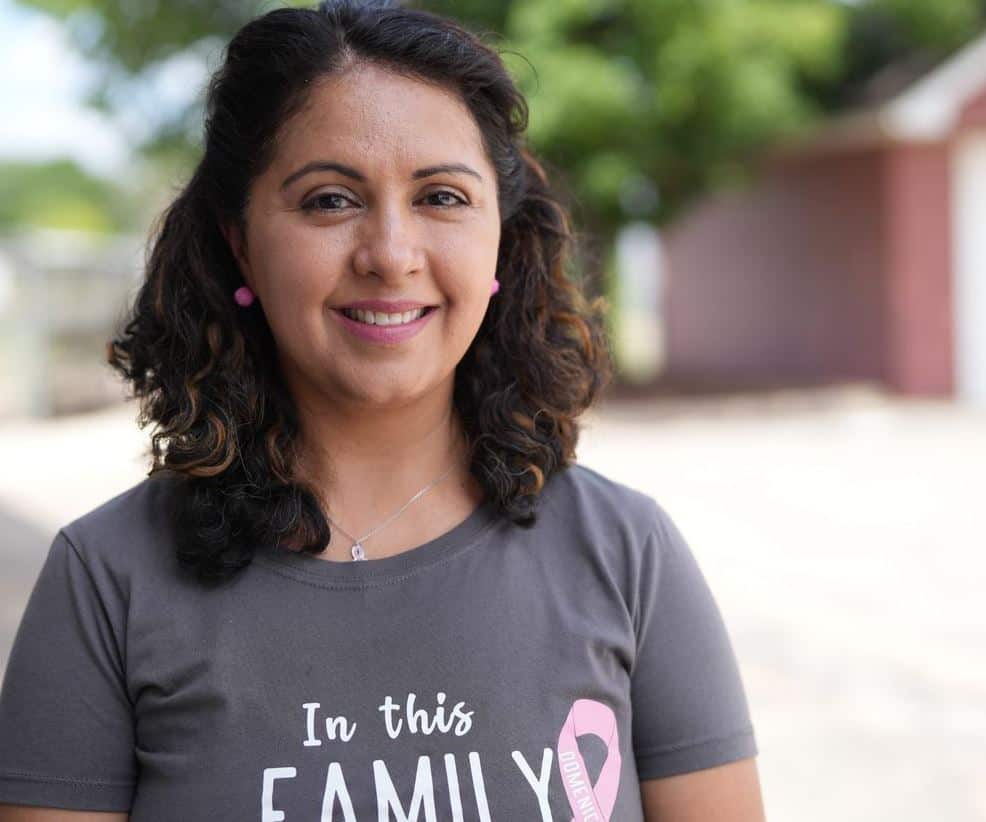
In 2020, Domenica Lagunas underwent treatment for stage 2 triple negative breast cancer. Prior to her diagnosis, she was proactive in leading a healthy lifestyle. She worked out and attended regular wellness appointments, including annual mammograms. When she learned she had breast cancer, it came as a shock.
As one of six sisters who grew up in a Hispanic household, Domenica Lagunas acknowledges that her family never really spoke about breast health. There was a level of discomfort about this topic — about not wanting others to know about personal health concerns, which could ultimately lead to incorrect or false information about breast cancer.
This stigma around breast health would sometimes keep women Domenica knew from getting mammograms. “I think it was a lack of awareness, resources and education,” she said. “Now as a breast cancer survivor and a mother, it’s important for me to talk to my children about breast health. It is possible for Latinas to be diagnosed with an aggressive form of breast cancer. Discussing breast health should be important within the Hispanic community and part of routine wellness conversations.”
In 2020, Domenica developed pain in her breast that radiated out and felt warm to the touch. It was just months after her annual mammogram, which came back clear, so initially she wasn’t alarmed. “I thought it was due to working out and lifting weights,” she said. Nonetheless, the discomfort persisted. When Domenica found a small lump during a self-exam, she called her doctor for a follow-up.
“At the time, cancer didn’t cross my mind,” Domenica recalled. “When I went for my follow-up, I was still not expecting it to be cancer.” After her scan and ultrasound, she knew something was wrong when the nurse returned to the room with the radiologist, who told her there was something of concern on the images. Domenica needed to undergo a biopsy as soon as possible.
“Waiting for the biopsy results was difficult. I said to my husband, ‘What does this mean for us, for our family and our future?’” she said. “Days later while I was at work, I noticed missed calls from my doctor asking me to call back immediately for the results. I knew at that moment it was going to be cancer. I was going to hear the news no one can ever be prepared for. When I heard the words ‘you have breast cancer,’ I was in a state of shock.”
Domenica’s treatment for stage 2 triple negative breast cancer included chemotherapy, surgery and radiation therapy. She also received physical and occupational therapies to help with side effects from treatment. Domenica was too weak to run or workout like she did pre-diagnosis, so she took up nature walks. Finding a way to stay active was important for her, and walking brought her a sense of comfort and peace for her healing and emotional well-being
“Cancer was difficult enough before COVID, but as a cancer patient who was immunosuppressed, it was really difficult,” she said. “In-person interactions were very limited due to COVID restrictions to ensure my health wasn’t compromised. My immediate family and other individuals reached out to show their support in various ways. When I think of my cancer journey, it’s inevitable not to think of going through it during a pandemic.”
Domenica’s main support came from her husband, daughters and son, who were her daily caretakers. They saw firsthand the changes brought on by cancer. “It affects the entire family living with someone going through this,” she said. “The strength I learned from my faith made me strong, along with the belief that God will carry me through this journey.”
When it came time to finding resources about breast cancer, Domenica turned to Susan G. Komen. “Cancer is such a scary word, and I knew I needed to find a trusted source of information,” she said. “I read survivor stories on Komen’s website and found questions I could ask my own care team.”
Domenica faced her journey head on. She empowered herself to be her own advocate in order to make the best decisions about her health and to be well informed throughout her treatments. “I didn’t choose to have cancer,” she said. “Cancer chose me.”
It’s important for Domenica to share her story with the Hispanic community to increase awareness about breast health and cancer. “There is a community for you,” she said. “We need hope, and research and donations can provide that. Whether someone is at the beginning, in the midst of it or are unfortunately no longer here to share their stories, we need hope.”
After Domenica was diagnosed, she didn’t see many people who looked like her when seeking out resources and information when undergoing treatment. She’s hopeful more representation will happen in studies and clinical trials.
“When I was first looking for information about breast cancer, I didn’t see enough studies for people like me. I didn’t see people like me participating in clinical trials,” she said. “As a Latina, it’s important for me to educate others about breast health — for our mothers, our daughters, our sisters, our aunts and anyone who possibly will walk through this journey.”
Statements and opinions expressed are that of the individual and do not express the views or opinions of Susan G. Komen. This information is being provided for educational purposes only and is not to be construed as medical advice. Persons with breast cancer should consult their healthcare provider with specific questions or concerns about their treatment.



